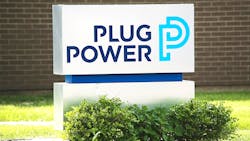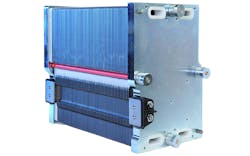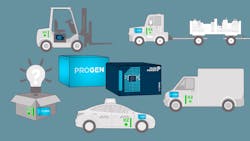Quietly, Plug Power slips in two big fuel cell advancements
After a few of its moves caught some attention earlier this year, Latham, NY-headquartered hydrogen fuel cell manufacturer Plug Power Inc. has new developments that could affect the commercial as well as automotive markets. One is a particular part that's just gone into production and the other could be a practical element of autonomous hydrogen-powered vehicles yet to come.
The company was part of a project earlier this year where FedEx put a hydrogen fuel cell-powered delivery truck into operation. The medium-duty delivery van came from Workhorse Group, while Plug Power built in the fuel cell motivation.
Then in June, Plug Power announced it had acquired American Fuel Cell (AFC) and would be working to assimilate that company's technology into its own to advance hydrogen fuel cells. That has now materialized.
Several months after the acquisition, Plug Power has brought AFC's membrane electrode assembly technology into the Plug Power ProGen hydrogen fuel cell systems. Think of membrane electrode assemblies, or MEAs, as a stack of plates; they contain the catalysts and other elements used to produce electricity that powers an electric motor, in this case.
The AFC acquisition brought to the equation that company's metal MEAs, which have twice the power density and a longer life than the graphite MEAs Plug Power used before. With higher power density, that could mean lighter fuel cell systems—a particular benefit for on-road commercial vehicles—and the longer product life also makes a good argument in commercial use.
"It's no secret that fuel cell adoption is on the rise," said Andy Marsh, CEO of Plug Power, pointing to KPMG identifying fuel cell electric vehicles earlier this year as having overtaken battery electric vehicles as the key "megatrend" in the automotive industry.
"Plug Power has the infrastructure required to ramp up production of our new ProGen metal plate stack, ensuring we're meeting the demands of this rapidly expanding industry," Marsh noted.
Hydrogen fuel cells used to power electric vehicle motors claim a number of benefits over battery banks that are charged from the grid and store electricity. Hydrogen is the most abundant element by far in the universe, and the only byproducts of a hydrogen fuel cell producing electricity are heat and water.
Fuel cells can produce that electricity instantly, and the vehicles can be refueled in as little as three minutes with Plug Power's stations. Between those stops, depending on how much hydrogen fuel is onboard, fuel cell-powered vehicles can offer much more range than battery-electrics.
Battery-electric vehicles not only may require very heavy banks of batteries to reach the range that vehicles—especially commercial ones—may need, they typically are charged overnight for hours. DC fast-charging can cut that down to a fraction of the time, but also shortens the batteries' usable service life.
And battery-electric vehicles can suffer a stiff performance drop in the cold or certain climate conditions, which can be another problem for commercial vehicles that often need to operate no matter what's going on outside. Hydrogen fuel cell-powered electric vehicles work just fine in the cold.
Further step in automation
Meanwhile, Plug Power has another trick up its sleeve with a project now underway in partnership with Rensselaer Polytechnic Institute's Center for Automation Technologies & Systems. RPI and Plug Power are developing a refueling station for hydrogen fuel cell vehicles run by robots.
It's initially intended for warehouse vehicles—not surprising, given that Plug Power's first application of its fuel cells was in forklift trucks. The project will be supported by a $2 million grant from the U.S. Dept. of Energy's Office of Energy Efficiency and Renewable Energy.
Students at the RPI institute developed the technology used to demonstrate how the robotic fueling station would work, including computer vision, sensors, robotic manipulation of the fueling nozzle, and remote-controlling mechanisms.
"The immediate goal of the robotic fueling station is to increase the ease and efficiency of fueling hydrogen-powered vehicles in warehouse settings, where every second amounts to more than $1,000 in annual cost impact for medium-to-large sites," according to Plug Power. But the company clearly sees expanded potential for such a system going forward.
"Today, the technology can retrofit existing GenFuel sites supporting the more than 20,000 GenDrive fuel cells in the field," contended Dustan Skidmore, vice president of engineering at Plug Power. "In the future, the technology can be used in on-road fleet vehicles, autonomous-guided vehicles, and self-driving passenger cars."
About the Author
Aaron Marsh
Aaron Marsh is a former senior editor of FleetOwner, who wrote for the publication from 2015 to 2019.




